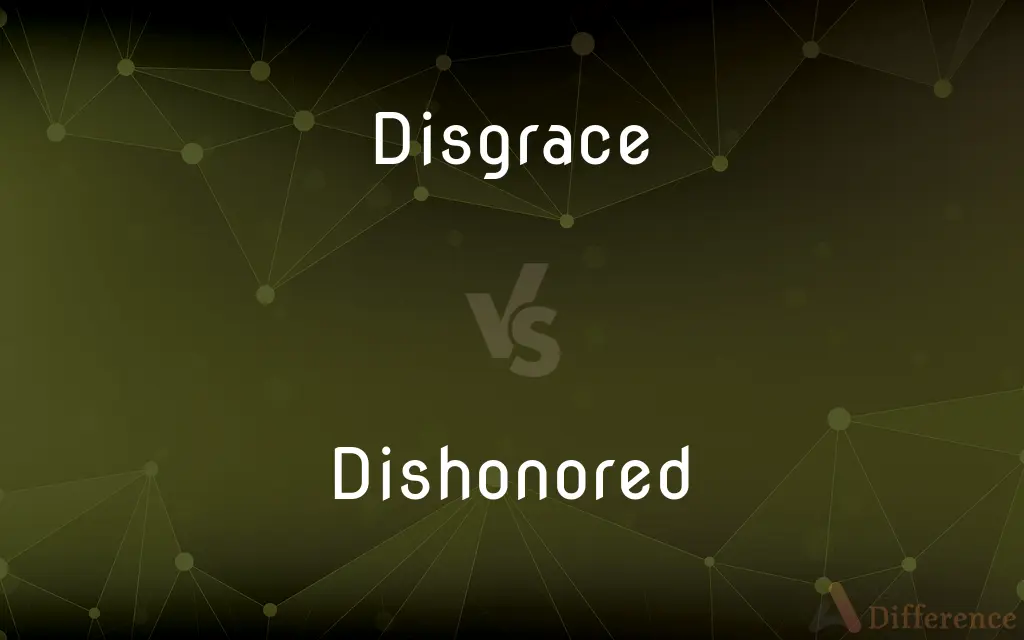Disgrace vs. Dishonored — What's the Difference?
By Tayyaba Rehman — Published on October 1, 2023
Disgrace" refers to a loss of honor, respect, or esteem. "Dishonored" implies a failure to uphold promises or duties, especially in contexts like payments. Both denote a diminished reputation.

Difference Between Disgrace and Dishonored
Table of Contents
ADVERTISEMENT
Key Differences
"Disgrace" and "Dishonored" are terms that address the negative perception or treatment of an individual or entity. While they overlap in certain contexts, their core meanings diverge in nuanced ways.
"Disgrace" primarily denotes a loss of honor or respect in society. It encapsulates a broader range of scenarios, from personal embarrassments to societal shunning. When someone is in "disgrace," it implies they've done something that's diminished their own or someone else's esteem or reputation. "Dishonored," on the other hand, carries more specific implications. It often refers to a failure to fulfill an obligation or duty.
For instance, in financial contexts, a "dishonored" check is one that's been rejected due to insufficient funds. While the result may lead to "disgrace" for the issuer, the term "dishonored" specifically marks the failure of a promise or duty. Conversely, someone can be in "disgrace" for myriad reasons unrelated to broken promises.
In summary, while both "Disgrace" and "Dishonored" involve negative perceptions, their applications differ. "Disgrace" broadly pertains to a loss of respect or esteem, whereas "Dishonored" underscores a failure to meet obligations or uphold promises.
Comparison Chart
Definition
Loss of honor, respect, or esteem.
Failure to fulfill obligations or uphold promises.
ADVERTISEMENT
Usage
Broadly used to describe personal or societal shunning.
Often specific to contexts like financial commitments.
Origination
Derived from "dis-" (loss of) and "grace" (favor or honor).
Derived from "dis-" (opposite of) and "honor."
Connotation
Suggests a fall from favor or reputation.
Implies a breach of trust or duty.
Form
Often used as a noun, but can be a verb (e.g., disgraced).
Primarily used as an adjective or past tense verb.
Compare with Definitions
Disgrace
Loss of reputation due to a shameful act.
His actions brought disgrace upon his family.
Dishonored
Not respected or trusted due to failing obligations.
He felt dishonored after breaking his promise.
Disgrace
State of being looked down upon by others.
After the scandal, she lived in disgrace.
Dishonored
Treated with contempt or disrespect.
His dishonored name was whispered in the halls.
Disgrace
Cause or bring about a fall in honor or respect.
His behavior will disgrace our community.
Dishonored
Having lost honor or good reputation.
The knight was dishonored after fleeing from battle.
Disgrace
A person or thing causing shame or dishonor.
The corrupt official was seen as a disgrace to the office.
Dishonored
Act of failing to uphold an expected duty or promise.
The broken treaty was a sign of a dishonored agreement.
Disgrace
Disgrace is a novel by J. M. Coetzee, published in 1999. It won the Booker Prize.
Dishonored
Refers to a financial obligation not met, like a check.
The bank returned the dishonored check.
Disgrace
Loss of honor, respect, or reputation; shame.
Dishonored
Dishonored is a 2012 action-adventure game developed by Arkane Studios and published by Bethesda Softworks. Set in the fictional, plague-ridden industrial city of Dunwall, Dishonored follows the story of Corvo Attano, bodyguard to the Empress of the Isles.
Disgrace
The condition of being strongly and generally disapproved.
Dishonored
Loss of honor, respect, or reputation.
Disgrace
One that brings disfavor or discredit
Your handwriting is a disgrace.
Dishonored
The condition of having lost honor or good repute.
Disgrace
To bring shame or dishonor on
Disgraced the entire community.
Dishonored
A cause of loss of honor
Was a dishonor to the club.
Disgrace
To deprive of favor or good repute; treat with disfavor
The family was disgraced by the scandal.
Dishonored
Failure to pay or refusal to accept a note, a bill, or another commercial obligation.
Disgrace
The condition of being out of favor; loss of favor, regard, or respect.
Dishonored
To bring shame or disgrace upon.
Disgrace
The state of being dishonored, or covered with shame.
Now she lives in disgrace.
Dishonored
To treat in a disrespectful or demeaning manner.
Disgrace
(countable) Something which brings dishonor; the cause of reproach or shame; great discredit.
His behaviour at the party was a total disgrace! He was leeching on all the ladies, and insulting the men.
Dishonored
To fail or refuse to accept or pay (a note, bill, or check, for example).
Disgrace
(obsolete) An act of unkindness; a disfavor.
Dishonored
Simple past tense and past participle of dishonor
Disgrace
(transitive) To put someone out of favor; to bring shame or ignominy upon.
Dishonored
Disgraced, defiled, treated with dishonor.
Disgrace
The condition of being out of favor; loss of favor, regard, or respect.
Macduff lives in disgrace.
Dishonored
Suffering shame
Disgrace
The state of being dishonored, or covered with shame; dishonor; shame; ignominy.
To tumble down thy husband and thyselfFrom top of honor to disgrace's feet?
Disgrace
That which brings dishonor; cause of shame or reproach; great discredit; as, vice is a disgrace to a rational being.
Disgrace
An act of unkindness; a disfavor.
The interchange continually of favors and disgraces.
Disgrace
To put out of favor; to dismiss with dishonor.
Flatterers of the disgraced minister.
Pitt had been disgraced and the old Duke of Newcastle dismissed.
Disgrace
To do disfavor to; to bring reproach or shame upon; to dishonor; to treat or cover with ignominy; to lower in estimation.
Shall heap with honors him they now disgrace.
His ignorance disgraced him.
Disgrace
To treat discourteously; to upbraid; to revile.
The goddess wroth gan foully her disgrace.
Disgrace
A state of dishonor;
One mistake brought shame to all his family
Suffered the ignominy of being sent to prison
Disgrace
Bring shame or dishonor upon;
He dishonored his family by committing a serious crime
Disgrace
Reduce in worth or character, usually verbally;
She tends to put down younger women colleagues
His critics took him down after the lecture
Disgrace
Damage the reputation of;
This newspaper story discredits the politicians
Disgrace
Loss of favor or esteem in society.
Falling from grace, the athlete lived in disgrace.
Common Curiosities
Which is broader in application, Disgrace or Dishonored?
"Disgrace" is broader, while "Dishonored" is often more specific to unmet obligations.
Can "Disgrace" be used as a verb?
Yes, e.g., "He disgraced himself with his actions."
What does a "dishonored check" mean?
It refers to a check that's rejected due to insufficient funds.
Can someone be both in disgrace and dishonored?
Yes, one can lead to the other, depending on the context.
Which word suggests a deeper fall from societal favor?
"Disgrace" often suggests a profound loss of societal esteem.
Share Your Discovery

Previous Comparison
Ethanol vs. Gasoline
Next Comparison
Skinny Jeans vs. Carrot JeansAuthor Spotlight
Written by
Tayyaba RehmanTayyaba Rehman is a distinguished writer, currently serving as a primary contributor to askdifference.com. As a researcher in semantics and etymology, Tayyaba's passion for the complexity of languages and their distinctions has found a perfect home on the platform. Tayyaba delves into the intricacies of language, distinguishing between commonly confused words and phrases, thereby providing clarity for readers worldwide.
















































